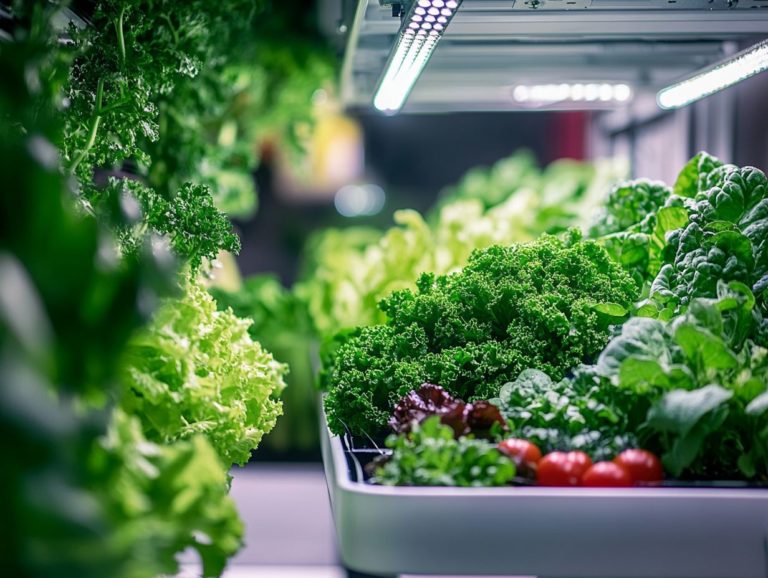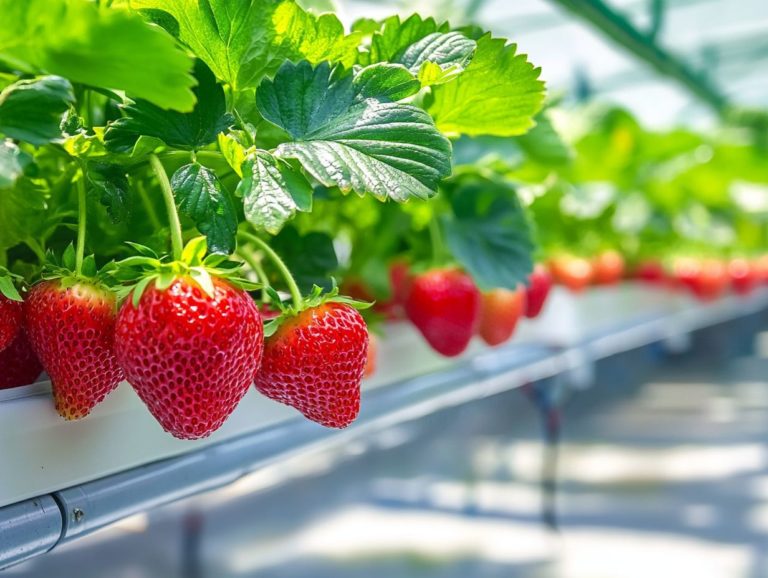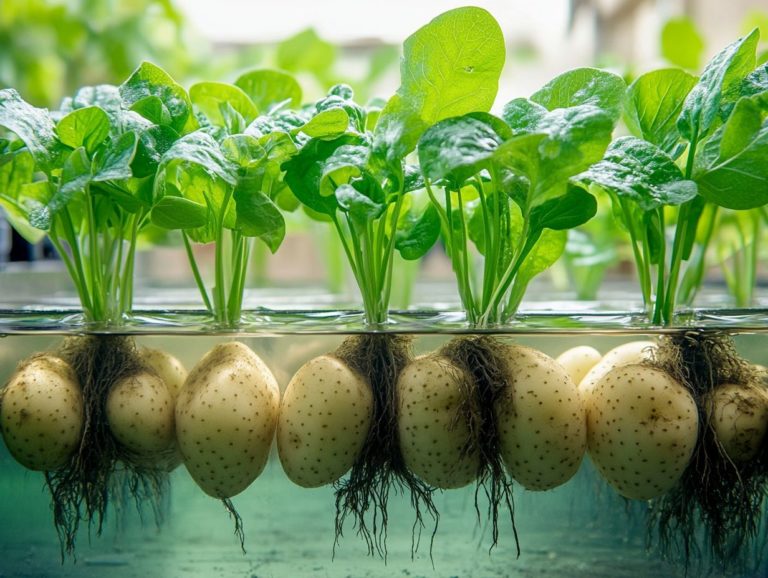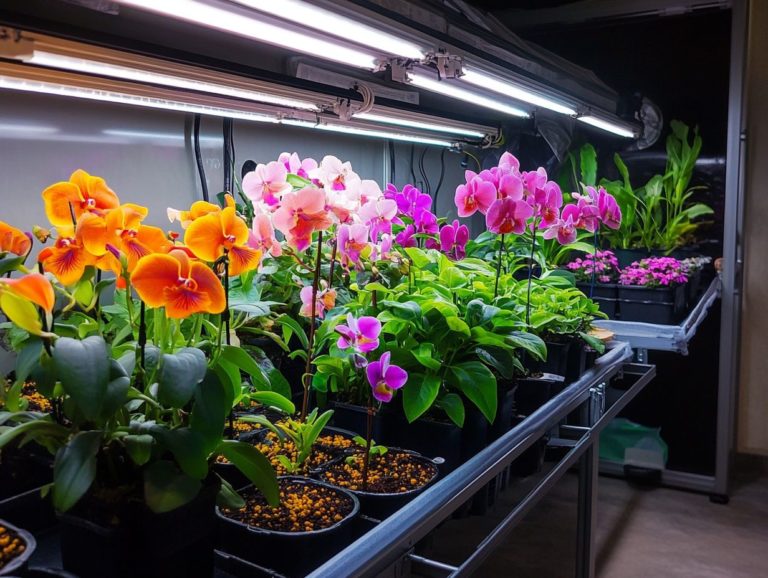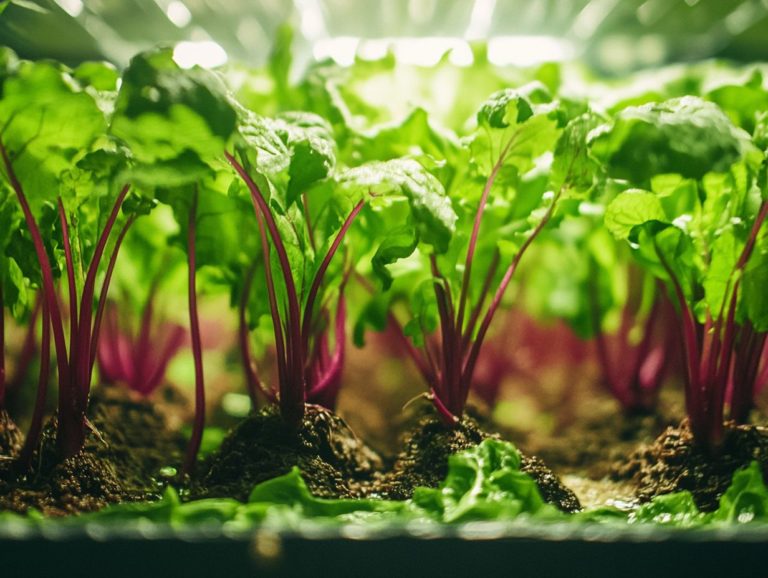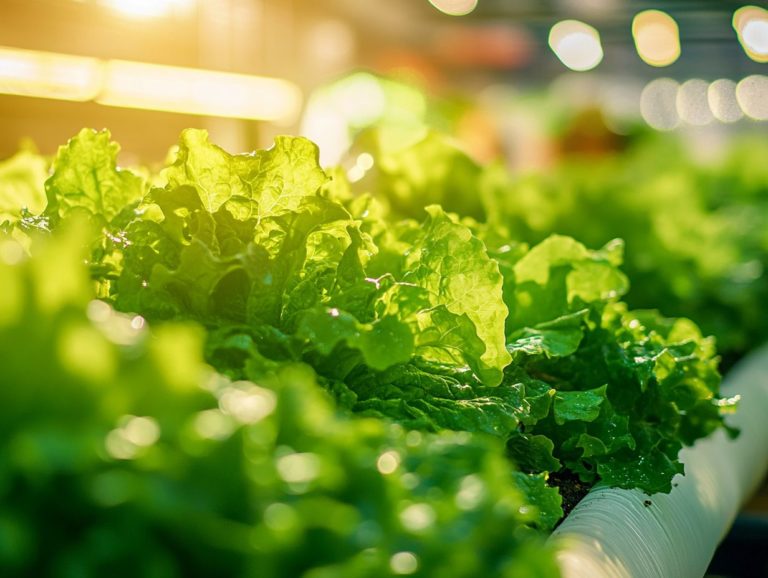“Choosing the Best Hydroponic Melon Varieties”
Hydroponic farming is revolutionizing crop growth. It presents methods that optimize yield and efficiency.
In this article, you ll delve into the fascinating realm of hydroponic melon cultivation. You ll explore the myriad advantages this technique offers and discover how to select the ideal melon varieties tailored to your setup.
Essential factors such as growing conditions, size preferences, and taste profiles will be meticulously examined. You will also find a curated list of top melon varieties well-suited for hydroponic growth, including systems ideal for both leafy greens and herbs.
You will gain valuable insights into sourcing high-quality seeds and implementing best practices to cultivate a thriving hydroponic garden.
Join in as you unlock the secrets to successful hydroponic melon farming, leveraging advanced techniques like aeroponics and deep water culture!
Contents
- Key Takeaways:
- Factors to Consider When Choosing Melon Varieties
- Top Hydroponic Melon Varieties
- How to Select and Purchase Melon Seeds
- Tips for Successful Hydroponic Melon Farming
- Frequently Asked Questions
- Curious about hydroponic farming and its benefits for growing melons?
- What factors should I consider when choosing the best hydroponic melon varieties?
- Which varieties of melons are best suited for hydroponic farming?
- What are the characteristics of high-quality hydroponic melon varieties?
- How do I know when it’s the right time to harvest my hydroponic melons?
- Can I save seeds from my hydroponic melons for future planting?
Key Takeaways:
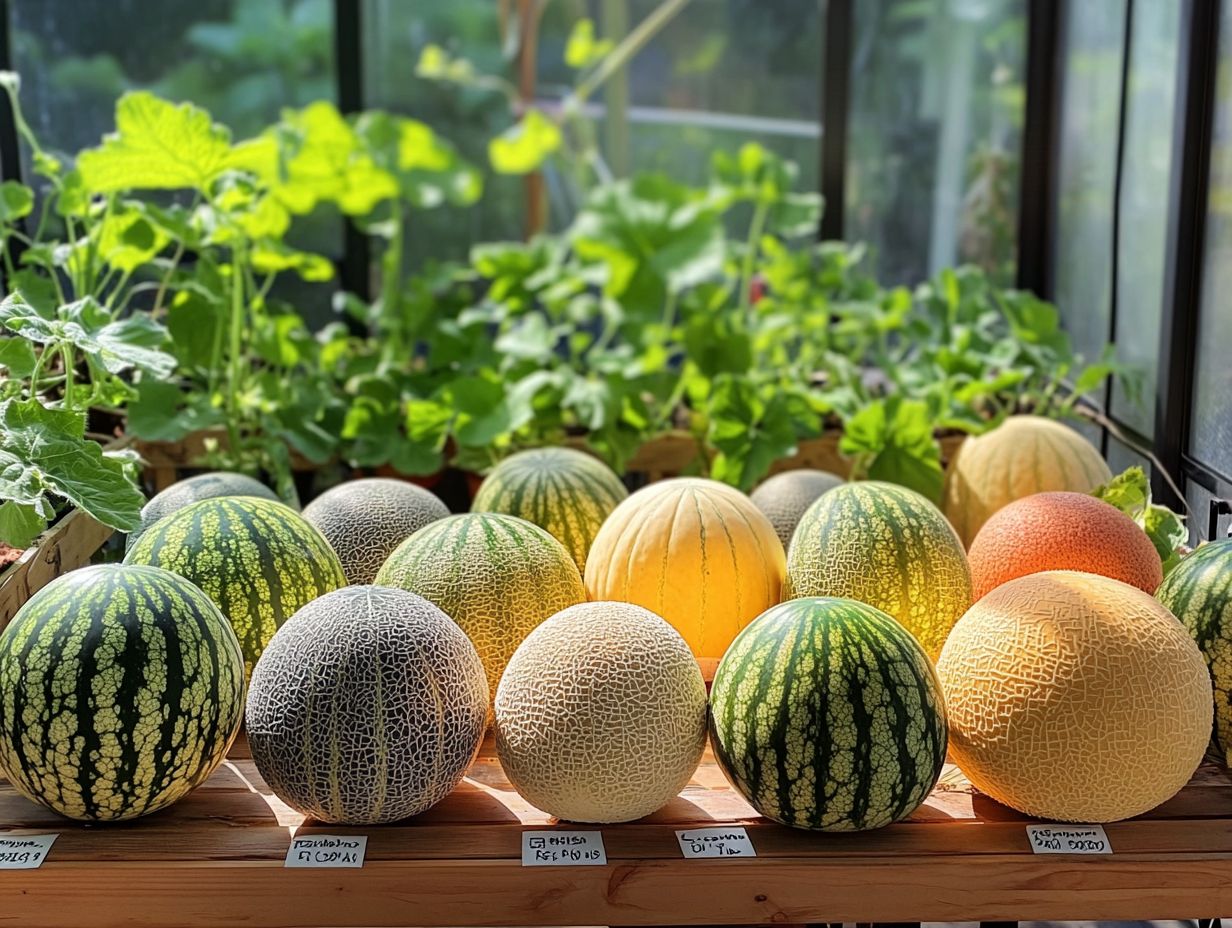
- Hydroponic farming has amazing benefits for melons and cantaloupes. You ll save water, use less space, prevent diseases, and grow year-round!
- Consider factors like growing conditions, size and shape preferences, and taste and texture when choosing the best hydroponic melon varieties for your farm.
- When purchasing melon seeds for hydroponic farming, look for high-quality seeds from reputable sources. Consider variety, disease resistance, and compatibility with your growing system.
What is Hydroponic Farming?
Hydroponic farming is a revolutionary method of cultivation that allows you to grow plants in a liquid that has essential nutrients for plant growth without soil. This means you can have enhanced control over environmental factors like temperature and moisture.
As this innovative approach gains traction in greenhouses worldwide, you can enjoy the benefits of producing a variety of crops think leafy greens, herbs, and melons in a more efficient and sustainable manner. It significantly reduces the risk of pests and diseases.
Rooted in ancient practices, hydroponics has undergone a fascinating evolution over the centuries. Techniques such as aggregate culture, which utilizes mediums like gravel or sand, and aeroponics, where plants are suspended in air and misted with nutrient solutions, have emerged.
These methods not only promote rapid plant growth and higher yields but also conserve water far more effectively than traditional soil-based agriculture. This makes them essential for regions like North Africa and Asia.
By eliminating the need for extensive land use, hydroponic systems play a crucial role in environmental management. They help reduce the carbon footprint associated with transportation and enable urban farming solutions that bring fresh produce closer to you, the consumer.
These advancements in hydroponic production are essential for tackling food security challenges in our ever-growing population. Hydroponics showcases itself as a cornerstone of sustainable agriculture worldwide.
Advantages of Growing Melons Hydroponically
Growing melons hydroponically presents a wealth of advantages that you ll find hard to resist. Imagine enjoying consistent quality, a significantly reduced risk of pests, and the complete absence of root diseases all while optimizing your production in a well-controlled environment.
This method lets you craft the perfect watering plan to supercharge your melons! It allows you to fine-tune irrigation and employ a nutrient solution meticulously crafted to cater to your plants’ specific needs, resulting in melons that are not only robust but also bursting with flavor.
Hydroponic gardening dramatically enhances water efficiency, using up to 90% less water compared to traditional soil cultivation. The space-saving aspect means you can cultivate melons in smaller areas, making it an ideal solution for urban farming or regions with limited agricultural space.
You re likely to witness improved yields, as controlled conditions foster faster growth cycles and superior fruit quality. This blend of water conservation, efficient land use, and increased production makes hydroponic melon cultivation an appealing choice for both commercial growers and passionate hobbyists alike.
Factors to Consider When Choosing Melon Varieties
Consider these key factors for the best results when choosing melon varieties for your hydroponic garden. Pay particular attention to environmental temperature and unique nutrient needs, especially a high potassium level, to achieve ideal growth.
Varieties like Minnesota Midget, Hearts of Gold, and Sugar Baby each have unique traits that can significantly impact flavor, texture, and yield. Making informed selections is essential for ensuring your cultivation success.
Growing Conditions and Climate
Creating the right growing conditions is crucial for successfully cultivating hydroponic melons. These plants thrive in full sun and temperatures that promote healthy growth and ripening. Understanding the climate requirements for various melon types is key to ensuring robust development and maximizing yields in your hydroponic systems.
Daytime temperatures should be between 70 F and 85 F, with nights being slightly cooler, around 60 F to 70 F.
Ensure adequate air circulation to maintain these conditions and reduce the risk of fungal diseases. Aim for a relative humidity level between 50% and 70% to support proper growth while protecting your plants from mold.
By carefully monitoring these factors, you can create an ideal environment that nurtures your melon crops, leading to sweeter fruits and increased productivity.
Size and Shape Preferences
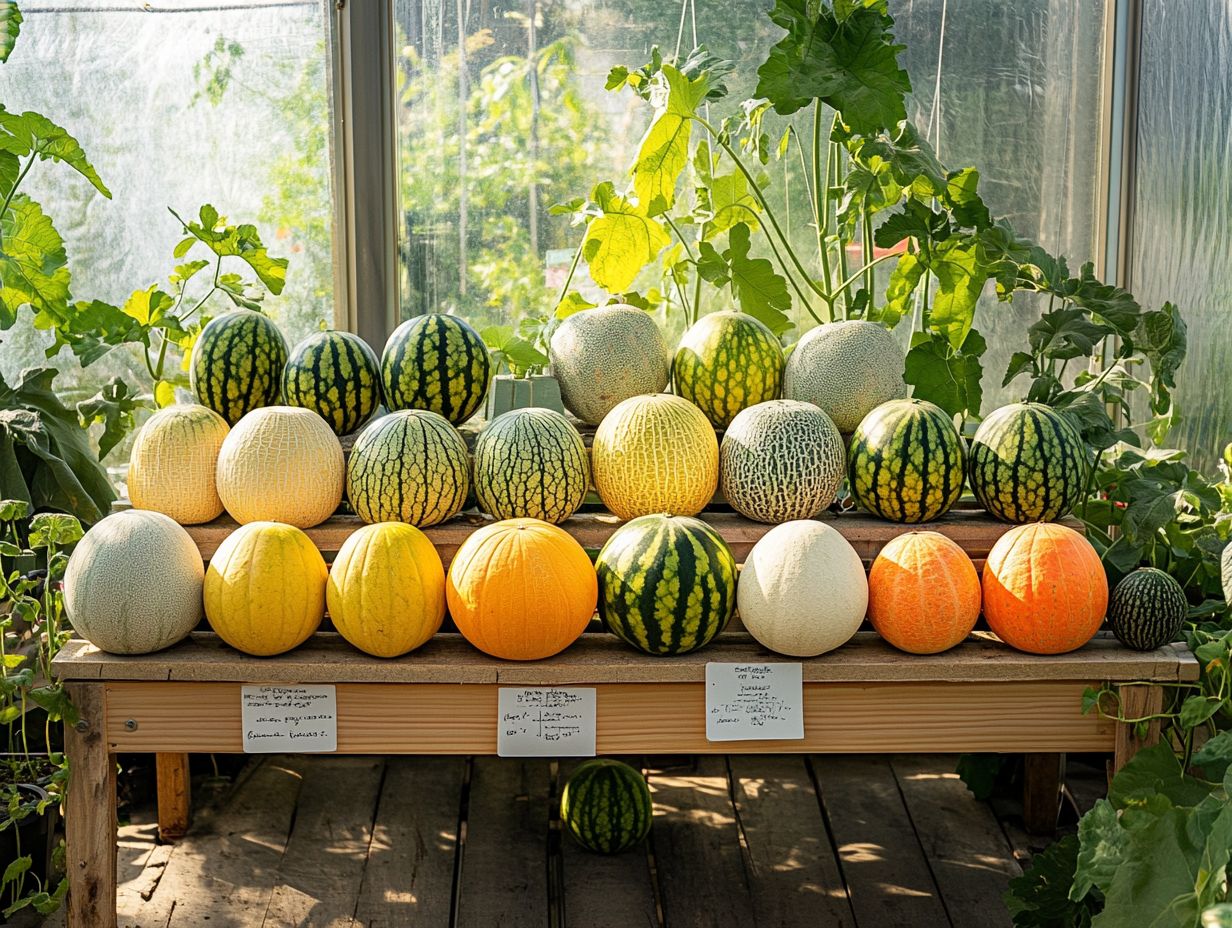
When selecting melon varieties, you likely have specific size and shape preferences in mind. Certain varieties yield melons that meet market demands. Understanding these preferences enables strategic selections that maximize both aesthetic appeal and consumer satisfaction.
Consumer trends significantly influence these choices. For example, round or oblong melons may appeal differently to various demographics. The growing trend of health-conscious shopping encourages you to choose varieties that taste great and look appealing in retail settings.
By aligning your hydroponic methods with these size and shape demands, you can enhance the visual and nutritional qualities of your offerings.
Ultimately, tailoring your selections to match market preferences can elevate the marketability of your melons, including varieties like Cantaloupe and Watermelon, while fostering greater consumer engagement.
Taste and Texture
The taste and texture of melons are essential elements for your success in hydroponic gardening. Consumers seek sweet melons with high sweetness levels, which are crucial for delivering excellent flavor. By understanding these sensory traits, you can make informed choices about variety selection and growing practices to ensure your produce stands out in quality.
Today’s consumers look for melons that taste exceptional and provide a satisfying mouthfeel. Factors like crispness and juiciness are crucial and often drive market trends toward varieties that excel in these areas.
By prioritizing ideal growing conditions and utilizing innovative growing methods without soil, such as trellising and using various media mixes, you can cultivate melons that meet consumer demands.
These advancements enhance flavor profiles and contribute to sustainable practices, aligning with the growing awareness of environmental impact in the food industry.
Top Hydroponic Melon Varieties
Among the top hydroponic melon varieties, you ll find Minnesota Midget, Hearts of Gold, and Sugar Baby standing out for their remarkable traits that appeal to both growers and consumers.
These varieties showcase distinct flavors, textures, and growth characteristics, making them exceptional choices for hydroponic cultivation across various environments.
Characteristics and Features of Each Variety
Each hydroponic melon variety offers unique characteristics that enhance its appeal to growers. Consider the compact Minnesota Midget, which is perfect for smaller spaces. The irresistibly sweet Hearts of Gold and the juicy Sugar Baby are also great options.
For instance, the Minnesota Midget thrives in containers and delivers a rich, sweet flavor perfect for local markets emphasizing fresh produce. On the flip side, the Hearts of Gold demands a touch more warmth but rewards you with a delectable taste that can enchant consumers in search of premium melons.
Meanwhile, the Sugar Baby shines with its consistently sweet, bite-sized fruits, making it a top choice for home growers and commercial producers eager to tap into the growing demand for convenient snacking options.
Each variety s adaptability and flavor profile unlock a world of niche marketing possibilities, appealing to diverse customer preferences and elevating your farming venture to new heights.
How to Select and Purchase Melon Seeds
Selecting and purchasing high-quality melon seeds is essential for your hydroponic gardening success. The right seeds can greatly affect both your yield and the taste of your harvest.
As you navigate this process, take into account several key factors, such as the source of the seeds and the specific characteristics of each variety. By doing so, you’ll enable yourself to make informed and strategic choices in your seed selection.
Where to Buy High-Quality Seeds
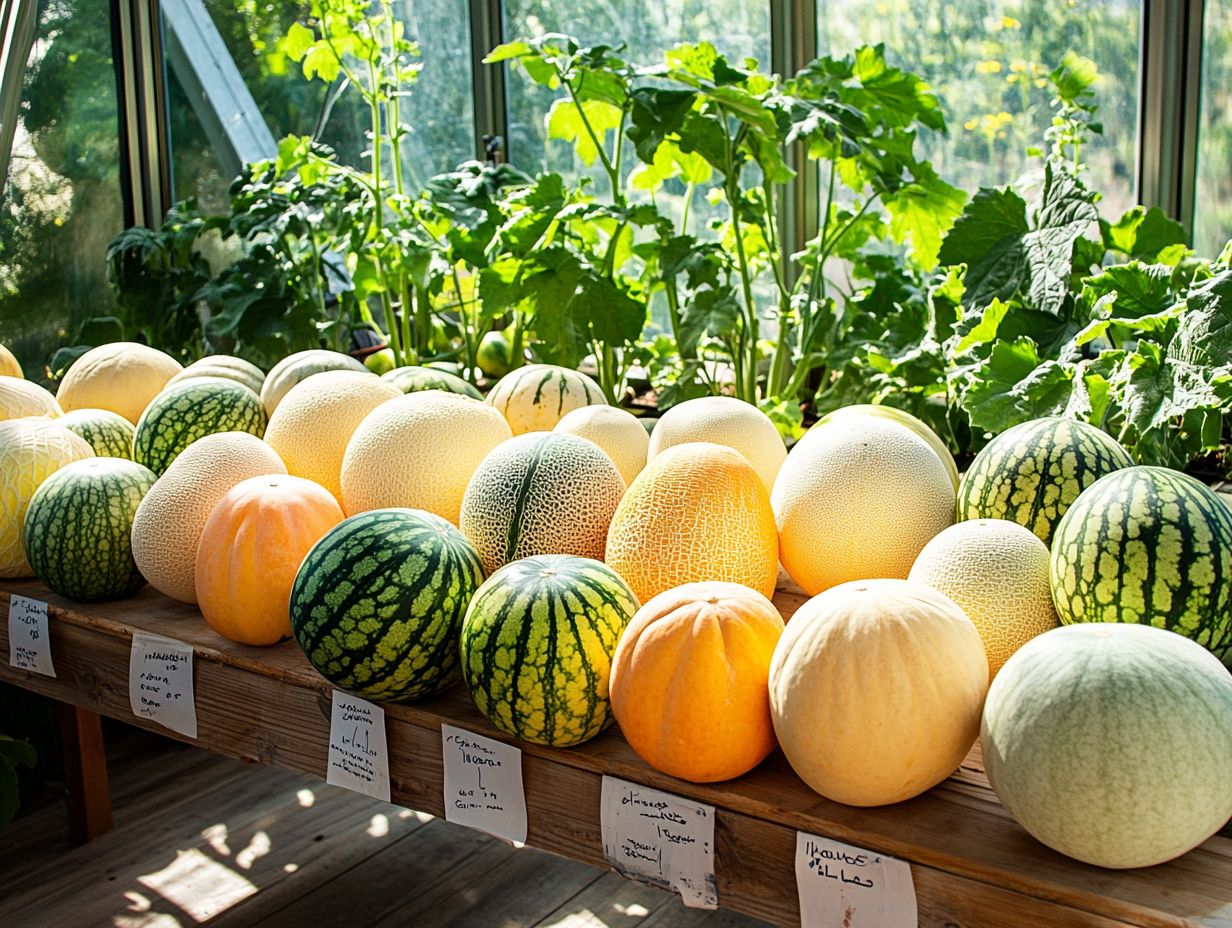
To obtain high-quality seeds for your hydroponic melons, seek out reputable sources such as specialized seed companies, agricultural cooperatives, or online retailers that focus exclusively on premium seeds. Ensuring the provenance and quality of your seeds is essential for maximizing both yield and flavor in your hydroponic gardening endeavor.
It s crucial for you to conduct thorough research on potential suppliers. Consider factors like customer reviews, industry reputation, and seed certifications. Certified seeds often indicate adherence to specific agricultural standards, guaranteeing that they are disease-free and genetically stable. Taking the time to examine seed packets or online descriptions can provide valuable insights into the seed’s origin and its suitability for hydroponic systems.
Prioritize these aspects to unlock the full potential of your melon crops and enjoy bountiful harvests!
What to Look for in a Good Seed
When you’re assessing what to seek in quality seeds, consider key characteristics like germination rate, disease resistance, and the specific traits of the melon variety you intend to cultivate. These factors are crucial for ensuring successful growth and yield in hydroponic systems.
The vigor of the seeds is paramount, as it directly affects both the speed of growth and the overall health of the plants, which is essential for thriving in controlled environments.
Purity also holds significant importance; high-quality seeds must be free from contaminants and genetic impurities to ensure that the plants are true-to-type and meet your desired standards.
Adaptability to hydroponic methods is yet another essential attribute, as seeds that flourish in water-based systems need to efficiently utilize nutrients while demonstrating resilience against variable conditions.
Therefore, conducting a thorough seed evaluation is critical for maximizing crop output and ensuring bountiful harvests.
Tips for Successful Hydroponic Melon Farming
To achieve success in hydroponic melon farming, it’s crucial for you to implement best practices. This includes optimizing your nutrient solutions and effectively managing environmental conditions.
By following these strategies, you can significantly enhance your yields and produce high-quality melons that cater to consumer preferences.
Best Practices for Optimal Growth and Yield
Implementing best practices for hydroponic melon farming can greatly enhance both growth and yield. Focus on the precise use of nutrient-rich water and irrigation techniques tailored to the unique needs of your plants. You ll discover how to unleash the full potential of your crops in controlled environments.
A crucial aspect of hydroponic systems is the meticulous management of nutrient concentrations. Ensure that your plants receive essential elements like nitrogen, phosphorus, and potassium in optimal ratios. Monitoring pH levels is vital as it directly affects nutrient uptake. Maintaining the pH between 5.5 and 6.5 is generally advisable for melons.
Effective disease prevention strategies are essential. Regular system sanitation and the introduction of beneficial microbes can minimize the risk of pathogen outbreaks. Incorporating appropriate lighting and temperature controls creates ideal growing conditions that support the successful cultivation of hydroponic melons.
Frequently Asked Questions
Curious about hydroponic farming and its benefits for growing melons?
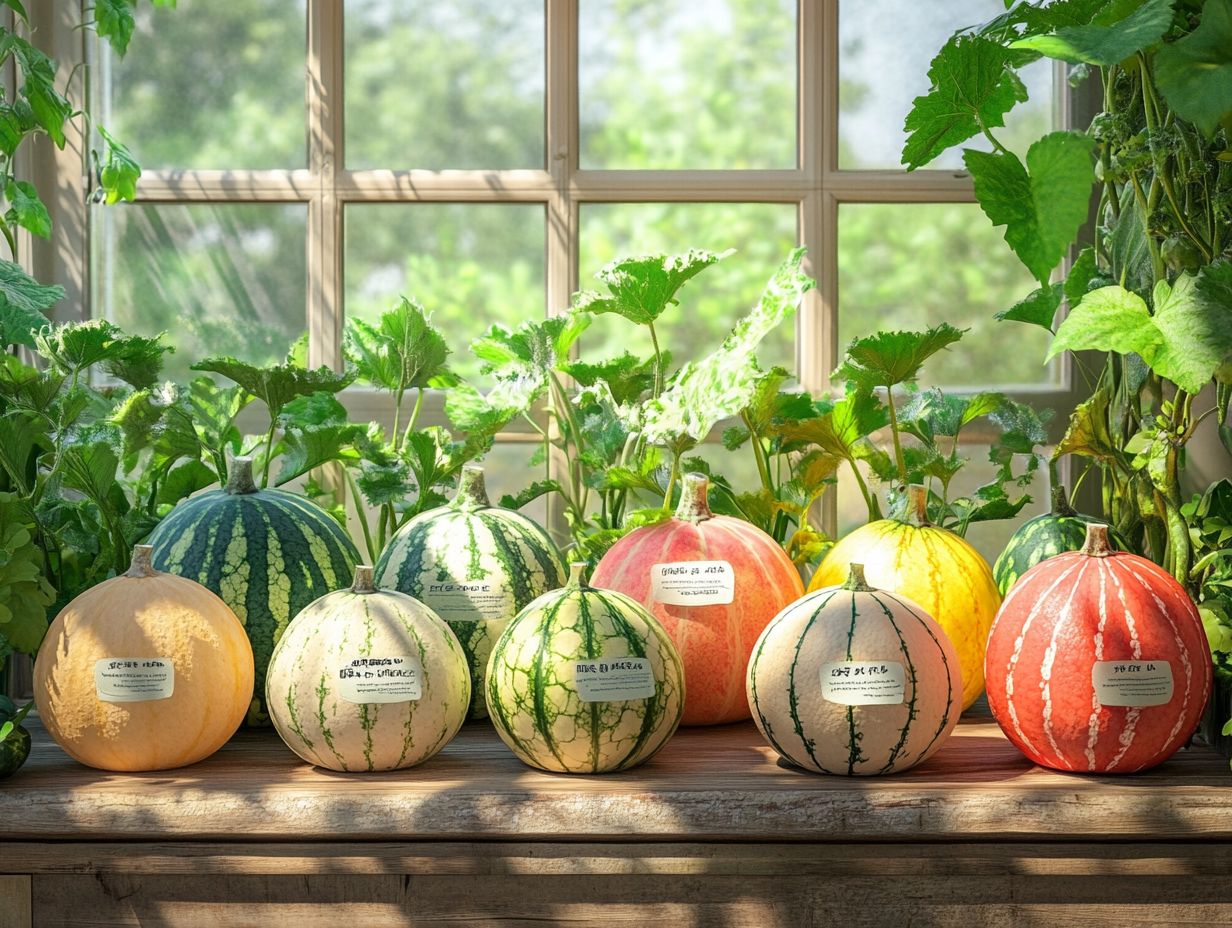
Hydroponic farming is a method of growing plants without soil, using a nutrient-rich water solution instead. This method is beneficial for growing melons because it allows for better control over growing conditions, resulting in healthier and more flavorful fruits.
What factors should I consider when choosing the best hydroponic melon varieties?
Consider climate, desired melon size, and available space when choosing the best hydroponic melon varieties.
Which varieties of melons are best suited for hydroponic farming?
Some of the best melon varieties for hydroponic farming include Cantaloupe, Honeydew, and Watermelon. These varieties thrive in warmer climates and have a shorter growing period, making them ideal for hydroponic systems.
What are the characteristics of high-quality hydroponic melon varieties?
When choosing hydroponic melon varieties, look for strong, disease-resistant plants that yield high quantities of fruit. Also, consider the fruit’s size, flavor, and color, as these can vary among different varieties.
How do I know when it’s the right time to harvest my hydroponic melons?
The right time to harvest hydroponic melons depends on the variety you are growing. Generally, melons are ready to harvest when they reach their full size and develop a sweet aroma. You can also check for slight softness on the bottom of the melon.
Can I save seeds from my hydroponic melons for future planting?
Yes, you can save seeds from your hydroponic melons for future planting. Ensure you properly dry and store the seeds in a cool, dark place. However, some hybrid varieties may not produce true-to-type offspring from saved seeds.
Ready to grow your own delicious melons? Start your hydroponic journey today!

